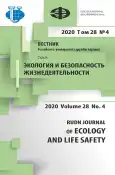The impact of magnesium on psycho-emotional stress and functional activity of the cardiovascular system in students from African countries
- Авторлар: Kirichuk A.A.1, Klimenko A.S.1, Lobanova Y.N.1, Pobilat A.E.1, Mazilina A.N.1, Koroleva A.A.2
-
Мекемелер:
- Peoples’ Friendship University of Russia (RUDN University)
- Center for Biotic Medicine
- Шығарылым: Том 28, № 4 (2020)
- Беттер: 408-416
- Бөлім: Human ecology
- URL: https://journal-vniispk.ru/2313-2310/article/view/323906
- DOI: https://doi.org/10.22363/2313-2310-2020-28-4-408-416
- ID: 323906
Дәйексөз келтіру
Толық мәтін
Аннотация
The objective of the study is investigation of the impact of magnesium on psycho-emotional stress and functional activity of the cardiovascular system in foreign male students of African origin. A total of 33 male first course students were involved in the study. The examinees were supplemented with 150 mg/day of magnesium. Evaluation of serum and urinary Mg levels was performed using inductively-coupled plasma mass-spectrometry, whereas functional activity of the cardiovascular system and psycho-emotional stress were assessed using Angioscan-01 diagnostic complex both before and after a course of magnesium supplementation. It has been demonstrated that magnesium supplementation resulted in a significant 3% increase in serum Mg levels as compared to baseline. The observed increase in circulating magnesium levels was associated with a significant 26% decrease in stress index, whereas arterial stiffness index significantly reduced by 3%. A significant increase in absolute systole duration and time from the start of the pulse wave to a maximum of the early systolic wave was also observed. The results of the study demonstrate a significant decrease in stress index and arterial stiffness in response to magnesium intake, being in agreement with the existing data on protective effects of magnesium. Therefore, monitoring of magnesium supply and its improvement may be considered as a valuable tool supporting somatic and psychic health of students thus improving their academic performance.
Негізгі сөздер
Авторлар туралы
Anatoly Kirichuk
Peoples’ Friendship University of Russia (RUDN University)
Хат алмасуға жауапты Автор.
Email: kirichuk-aa@rudn.ru
ORCID iD: 0000-0001-5125-5116
Candidate of Agricultural Sciences, Associate Professor, Department of Forensic Ecology with the Course of Human Ecology
6 Miklukho-Maklaya St, Moscow, 117198, Russian FederationAnna Klimenko
Peoples’ Friendship University of Russia (RUDN University)
Email: klimenko-as@rudn.ru
ORCID iD: 0000-0001-8591-3746
Candidate of Medical Sciences, Associate Professor, Director, Outpatient Polyclinic Center, RUDN Clinical and Diagnostic Center
6 Miklukho-Maklaya St, Moscow, 117198, Russian FederationYulia Lobanova
Peoples’ Friendship University of Russia (RUDN University)
Email: lobanova_ju@mail.ru
ORCID iD: 0000-0002-0934-4315
Candidate of Biological Sciences, Associate Professor, Department of Medical Elementology
6 Miklukho-Maklaya St, Moscow, 117198, Russian FederationAnna Pobilat
Peoples’ Friendship University of Russia (RUDN University)
Email: pobiiat_anna@mail.ru
Candidate of Medical Sciences, senior lecturer, Department of Medical Elementology
6 Miklukho-Maklaya St, Moscow, 117198, Russian FederationAksana Mazilina
Peoples’ Friendship University of Russia (RUDN University)
Email: gman65@mail.ru
ORCID iD: 0000-0003-4785-2668
Candidate of Medical Sciences, senior lecturer, Department of Medical Elementology
6 Miklukho-Maklaya St, Moscow, 117198, Russian FederationAnastasia Koroleva
Center for Biotic Medicine
Email: koroleva@drskalny.ru
therapist
46 Zemlyanoy Val St, Moscow, 105064, Russian FederationӘдебиет тізімі
- Kuryasev IA. Stress and stress resistance of students. Bulletin of the Peoples’ Friendship University of Russia. Series: Ecology and Life Safety. 2013;(5):64-67. (In Russ.)
- Ivanova AD, Raerindzatuvu ZhS. Problems of psychological and pedagogical adaptation of foreign students in Russia. Scientific Review. Pedagogical Sciences. 2017;(4):57-61. (In Russ.)
- Abdullah SF, Shah NA, Idaris RM. Stress and its relationship with the academic performance of higher institution students. International Journal of Advanced Research in Education and Society. 2020;2(1):61-73.
- Huang CJ, et al. Cardiovascular reactivity, stress, and physical activity. Frontiers in Physiology. 2013;4:314.
- Kirichuk AA, Radysh IV, Chizhov AYa. Activity, imbalance and adaptive reactions of the functional systems of the organism of foreign students of the Peoples' Friendship University of Russia in a megacity. Human Ecology. 2019;(1):20-25.
- Kirichuk AA. Interrelations between the exchange of essential trace elements and the functional state of the cardiovascular system in foreign students. Trace Elements in Medicine. 2020;21(3):33-42.
- Yamanaka R, Shindo Y, Oka K. Magnesium is a key player in neuronal maturation and neuropathology. International Journal of Molecular Sciences. 2019;20(14):34-39.
- Lingam I, Robertson NJ. Magnesium as a neuroprotective agent: a review of its use in the fetus, term infant with neonatal encephalopathy, and the adult stroke patient. Developmental Neuroscience. 2018;40(1):1-12.
- Tangvoraphonkchai K, Davenport A. Magnesium and cardiovascular disease. Advances in Chronic Kidney Disease. 2018;25(3):251-260.
- Boyle NB, Lawton C, Dye L. The effects of magnesium supplementation on subjective anxiety and stress - a systematic review. Nutrients. 2017;9(5):429.
- Botturi A, et al. The role and the effect of magnesium in mental disorders: a systematic review. Nutrients. 2020;12(6):1661.
- Sartori SB, Whittle N, Hetzenauer A, Singewald N. Magnesium deficiency induces anxiety and HPA axis dysregulation: modulation by therapeutic drug treatment. Neuropharmacology. 2012;62(1):304-312.
- Kirkland AE, Sarlo GL, Holton KF. The role of magnesium in neurological disorders. Nutrients. 2018;10(6):730.
- Del Giorno R, et al. Consequences of supraphysiological dialysate magnesium on arterial stiffness, hemodynamic profile, and endothelial function in hemodialysis: a randomized crossover study followed by a non-controlled follow-up phase. Advances in Therapy. 2020;37(12):4848-4865.
- Talari HR, et al. Effects of magnesium supplementation on carotid intima - media thickness and metabolic profiles in diabetic haemodialysis patients: a randomized, double-blind, placebo-controlled trial. British Journal of Nutrition. 2019;121(7):809-817.
- Kostov K, Halacheva L. Role of magnesium deficiency in promoting atherosclerosis, endothelial dysfunction, and arterial stiffening as risk factors for hypertension. International Journal of Molecular Sciences. 2018;19(6):1724.
- Al Alawi AM, Majoni SW, Falhammar H. Magnesium and human health: perspectives and research directions. International Journal of Endocrinology. 2018:9041694. http://dx.doi.org/10.1155/2018/9041694
Қосымша файлдар









